#i love media analysis
Explore tagged Tumblr posts
Text
AwaE's "Tale of the Magical Island" play
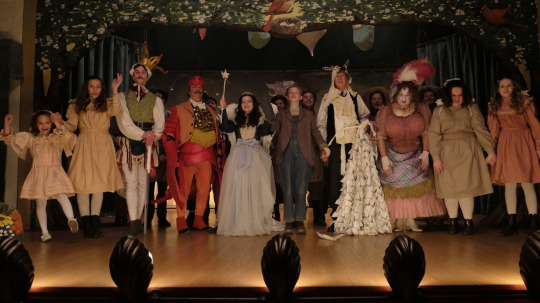
In the the sixth episode of Season 2 of Anne with an E entitled "I Protest Against Any Absolute Conclusion," the community of Avonlea comes together to put on the annual Christmas Pantomime. In this meta, I offer my analysis of this story within a story.
Not only does the plot of the panto draw heavily upon the story of Adam and Eve, but in my interpretation, it also allegorically serves as a way for Avonlea to use the medium of the theatre to process and come to grips with the threat that the grifters posed to their "magical island" community.
First, a brief synopsis of the play:
The opening number introduces the audience to an agrarian community residing on a "Magic Fantastical Island." Our hero, a farm boy, encounters a Fairy Princess who, seeing The Boy's hard work and goodness, bestows upon him a Golden Apple Tree which he vows to faithfully protect. A Dame happens upon the Golden Apple Tree and asks The Boy to hand her one of its fruits, but he refuses. When the Dame steals an apple, the Devil Lobster appears accompanied by a catchy tune. Things seem bleak when the Devil Lobster gets ahold of one of the apples, but a Prince on a noble steed arrives to vanquish the evil foe. However, the Devil Lobster thwarts the Prince by crushing his sword in his claws. As stormy skies swirl overhead, The Boy digs a large Black Hole with his trusty shovel and tricks the Devil Lobster into falling in. The hole swallows up the Devil Lobster, the day is saved, and they all lived happily ever after!
The Panto as Allegory for the Grifter Arc:
Ultimately, this play tells a simple story in which good triumphs over evil with a moral about resisting temptation and the perils of greed.
I would like to call attention to the fact that the apples are painted gold. Like their edenic counterpart, they symbolize sin and temptation, but in the context of this allegory, they also represent the enticing prospect of finding gold in Avonlea.

One of the Prince's lines suggests that if the Devil Lobster got his hands on the golden apples, it would bring spoil and rot upon the town's land ("You think you can turn our land into rot?/ I'm the unconquerable prince, lest you forgot!"). This parallels the threat that the mining operation posed to Avonlea—digging up the earth in the hopes of finding gold would have defiled the land and brought environmental destruction to the small farming town.
The Devil Lobster is defeated by falling into the Black Hole—this bears a striking resemblance to how Mr. Dunlop was ultimately caught by the townsfolk in S2E3 after he fell down the mining shaft at Nate's dig site.
It's significant that The Boy is the one who digs the hole to stop the Devil Lobster. The Boy represents the every child, and more specifically, the youth of Avonlea. While the adults of the town were easily swindled by Nate and Mr. Dunlop's gold scheme, it was children, specifically Anne, Diana, and to some extent Jerry, who were able to see through the grifters' ruse, put all the pieces together, and try to stop them from getting away with their scheme.
The version of events rendered in the play puts a more heroic spin on the role The Boy plays in thwarting the evildoer. He actively sets a trap for the Devil Lobster using the pivotal prop—a shovel—to do so. Since a shovel is a tool of excavation, this reflects how the excavation site Nate initially used to stage his con became a trap and holding place for Dunlop when their ruse came crashing down.
In reality, our child heroes were not so active nor successful in thwarting Nate and Dunlop. Only Dunlop was captured whereas Nate got away with the money. After their sleuthing in Charlottetown, Anne and Diana tried to warn the Barrys about what they'd discovered, but Diana's mother wouldn't hear any of it. Anne told Marilla who thankfully believed her, but by then it was too late, and the two literally got tied up. Meanwhile, Jerry had his own moment of realization, finally recognizing the boarders as the thieves who mugged him and stole his money in the finale of season 1. He tried to throw a punch at Nate, but got beat up again and fell unconscious. Mr. Dunlop only fell into the hole, not by any of the children's doing, but because he and Nate turned against each other.
The play credits the children as the real heroes in the story and offers a happier ending than the real version of events in which the community is still reeling from the financial blow of the con, lingering distrust—especially of outsiders—and feelings of regret and shame. In particular, we see how Marilla blames herself for inviting the boarders into their community and how the fallout of the the con hits the Barrys especially hard, manifesting as marital conflict between Diana's parents. The play's happier version of events helps the town process the ordeal they've gone through and imparts a moral they learned from the experience.
Each Character's Role in the Panto:
Anne as The Boy: Like the show itself, Anne is the protagonist of the play, our plucky hero. Her stepping into the role of The Boy was foreshadowed with her trip to Carmody earlier in the episode during which she dressed up like a boy. It's also fitting that Anne plays this part since she was the one who put all the clues together about the boarders' true intentions. The fact that Anne replaces Josie in the lead role of the play, as well as Matthew's last-minute substitution for Billy as the Owl, signifies that Anne and the Cuthberts are forces of progressive change in Avonlea.
Diana as the Fairy Princess: Most characters, including Anne, see Diana as the angelic image of a proper lady. She's generous, sweet, beautiful, and comes from a wealthy family. Like her Fairy Princess counterpart who awards The Boy for his hard work, Diana sees Anne's virtues even when others don't, and overall is a supportive and generous friend.
Matthew as the Owl: Matthew stepping into this role is foreshadowed in his flashback with his brother Michael in which a young Matthew can be seen whittling an owl figurine. Owls are associated with wisdom and true sight. This is a fitting choice for a narrator character in a play and also suits Matthew who demonstrates real wisdom.
Mr. Lynde as the Devil Lobster: In S2E2, a townsperson remarks that Mr. Lynde shows no moderation whatsoever as he piles his plate full of sweets. The Devil Lobster is the embodiment of greed and avarice and proclaims that he is "simply shimmering with sin." Tamatoa who? I only know the Devil Lobster! Also, it's clear that Rachel is super into seeing her husband acting a bit naughty and decided to have some fun with this casting choice.
The minister as the Fair Dame: Seeing the minister in drag is played for comedic effect. The Dame plays the part of Eve taking the apple from the Garden of Eden. While the minister was skeptical about the gold testing business, he did not dissuade the town's eagerness for material riches and therefore also shares responsibility for inviting avarice into Avonlea.
Mr. Phillips as the "Unconquerable" Prince: This is also played for laughs as it demonstrates Mr. Phillip's inflated sense of ego. He envisions himself as a gallant hero when in reality, he is anything but. The Prince is ineffectual at fighting off the Devil Lobster and runs away like a coward, much like how the adults and authority figures of Avonlea were completely bamboozled by the grifters.
Rachel Lynde as Queen Victoria: Perhaps a narcissistic casting choice on the part of Rachel, but let's be real, she was the artistic director behind this whole production and knocked it out of the park. Pop off, queen!
I hope you enjoyed this discussion of the "play within a play" in S2E6 of Anne with and E. This is probably my favorite episode in the whole series due to its many wholesome moments, especially Jerry giving Anne his Christmas card, Gilbert and Bash coming over to the Cuthbert's for Christmas dinner, and Matthew overcoming his stage fright. 10/10 would recommend. Of course the Christmas episode absolutely slaps!
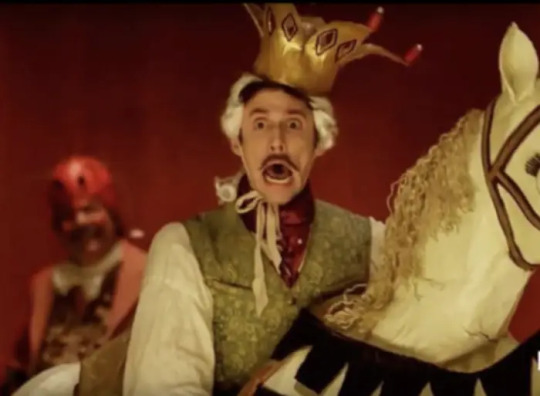
#anne with an e#awae#awae s2e6#anne with an e s2e6#Christmas pantomime#meta#story within a story#i protest against any absolute conclusion#christmas panto#anne shirly cuthbert#matthew cuthbert#diana barry#mr. phillips#thomas lynde#rachel lynde#awae meta#anne with an e meta#i love media analysis#episode of all time#my favorite episode#i love this show#the devil lobster song slaps way harder than it has any right to#lowkey appreciation for the grifter arc#i know it's unpopular#but it serves a purpose#and presents a conflict that affects the whole community#and the natural word itself#extractivism is presented as an existential threat#ecofeminist slay for awae wbk#it makes up for the liberalism of “a gender balance” in S3
18 notes
·
View notes
Note
hii okay sorry to be annoying -- im an ep behind on white lotus but the way you LITERALLY PREDICTED piper's story line is crazy!!

im shook like genius genius stuff <3 sorry just wanted to say that your big brain is amazing!! hope youre having a good week :)
YESSS ILY THANK UUU you could never annoy me <3<3
I felt Piper was acting a bit sus regarding her thesis and was scared to tell her judgy family about wanting to join the meditation center. I just figured she wanted to become a nun! I'm not educated on Buddhism so not sure if she just wants to join the medication program or become a nun, but I'm sure she'll have to live a very modest life in the temple regardless.
3 notes
·
View notes
Text
me refreshing my inbox: AO3 USERS!! DROP ANOTHER ESSAY-LENGTH COMMENT AND MY LIFE!!! IS YOURS!!!!!!!
#I LOVE MEDIA ANALYSIS#i love it when people get my easter eggs#i love it when I make people feel shrimp emotions#i'm so bad at replying to them BUT I'M TRYING TO GET BETTER#a03 fanfic#ao3#fanfic#writers
9 notes
·
View notes
Text
K so is the ned low episode a mirror of eroticism or is my brain truly disentigrated into degeneracy. Obsession with music and recognition is torturous. The revenge find happiness and love for each other and themselves. Pete and Lucius have been having freaky fuck nasty gay sex the past 24 hours. Different types of love. Zhsng yi Sao loves conquering the seas. ALSO stede n ed went all the way finally too. They've been branded in a matching way. They're connected as one.
Power is different for everyone. Stede is getting stronger, ed is softer. Izzy gets new legs and mindset. The crew needs safe excitement. Wee John and Jim were strong in their drag. Zheng yi Sao is making money moves. They all took their posions and made it positve.
12 notes
·
View notes
Text
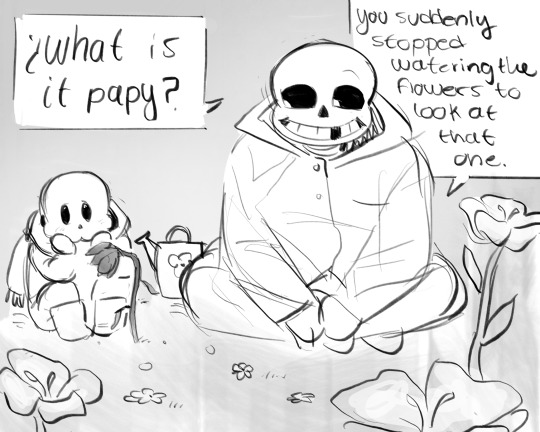

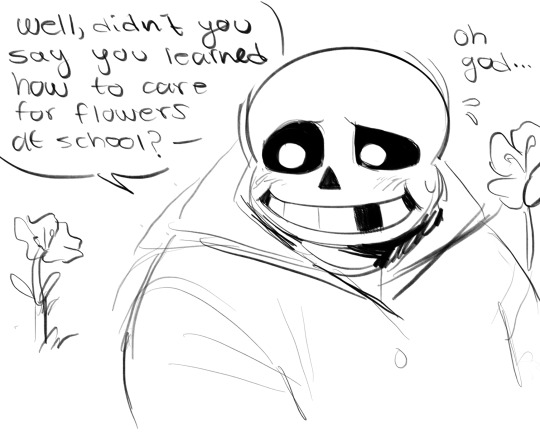






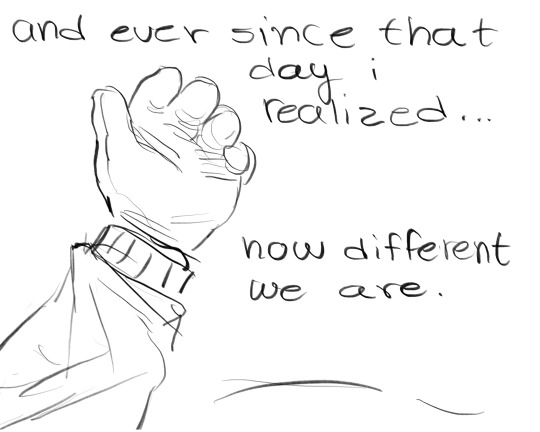
#comic#this comic is about how different the skelebros are#it makes sense to me#there are two panels that didn’t fit in this post#this comic has a lot of little meanings but I don’t know how to explain them#if you have insane reading comprehension and media literacy and a passion for character over analysis#you are going to love this#sans undertale#sans the skeleton#papyrus#sans#fanart#undertale comic#undertale#undertale fanart#skelebros
8K notes
·
View notes
Text
My god- this is such a beautiful dialogue.
This is what I miss about talking with my fellow nerds in college.
Also “She somehow didn’t expect me to pack a toolbox” is such a LINE.
Like- why wouldn’t you try everything out and then use what is most useful to the situation?
Picking one style of analysis or even just THINKING forevermore is just so BORING.
One thing about fandom culture is that it sort of trains you to interact with and analyze media in a very specific way. Not a BAD way, just a SPECIFIC way.
And the kind of media that attracts fandoms lends itself well (normally) to those kinds of analysis. Mainly, you're supposed to LIKE and AGREE with the main characters. Themes are built around agreeing with the protagonists and condemning the antagonists, and taking the protagonists at their word.
Which is fine if you're looking at, like, 99% of popular anime and YA fiction and Marvel movies.
But it can completely fall apart with certain kinds of media. If someone who has only ever analyzed media this way is all of a sudden handed Lolita or 1984 or Gatsby, which deal in shitty unreliable narrators; or even books like Beloved or Catcher in the Rye (VERY different books) that have narrators dealing with and reacting to challenging situations- well... that's how you get some hilariously bad literary analysis.
I dont know what my point here is, really, except...like...I find it very funny when people are like "ugh. I hate Gatsby and Catcher because all the characters are shitty" which like....isnt....the point. Lololol you arent supposed to kin Gatsby.
#i love media analysis#media analysis#media illiteracy#stories#what do they want to say?#what else are they saying underneath that?#what sort of stories will you run into next?
43K notes
·
View notes
Text
*Sees conversation about two peoples different interpretation of a line of text in the books*
*joins conversation basically 'yes and'ing one of those interpretation with my own even deeper interpretation of that text*
*gets told "but that's just a headcannon, it's not explicitly stated in the books."*
My brother's and sisters in Christ, you know ALL "text interpration" IS "headcannons" right? Like any time you go past the surface level, face value, explicit words on the page to discuss your personal interpretation of that dialog you are engaging in headcannons. You are using the same amount of finding evidence within the subtext to support or deny your claims about what you think a line might mean as me. Don't dismiss and shut down my insights as "just a headcannon" and lift your own opinions up as the far more educated and grounded "text interpretation" when those two phrases are the exact same thing.
It's all text interpretation. It's all head cannons. Why are yours worth discussing and debating but mine aren't? I never said my view is the one objective truth, I said "I think" same as you. Neither one of us will ever be 100% confirmed as "right" or not. But I thought we were all using the subtext as our supporting evidence to discuss a peice of media we all enjoy on a deeper level. Why is my take seen as nonsubstansiated theorizing (despite the fact I actually have so much evidence I could point to from the text to further back that interpration up) but yours is totally sanctioned analysis?
If it's worth discussing whether or not a specific line of dialog is evidence of a characters view points on something then it's worth discussing why that character might feel that way. It's all 'head cannon' because none of it is explicitly stated in the text. That's the point. I thought this was a book club moment where we all get to add our own insights, not a 'all opinions are valid, except for yours' moment. Wtf
#personal rant#sorry yall i just needed to vent#i love media analysis#i love literary discussions#i have a special interest in analyzing subtext and symbolism in books in media#ive taken so many ap and college level classes on how to do exactly that#i wanted to engage with people and was shamed for it#and now im baffled and offended on how what i said is somehow diffrent or worse#just ignore me
1 note
·
View note
Text
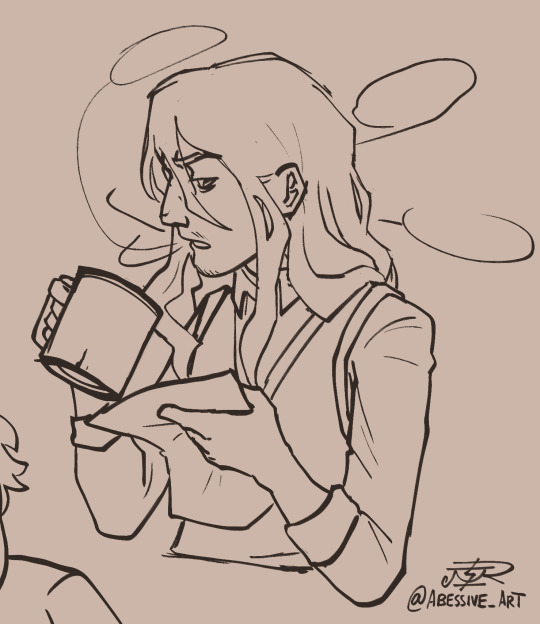
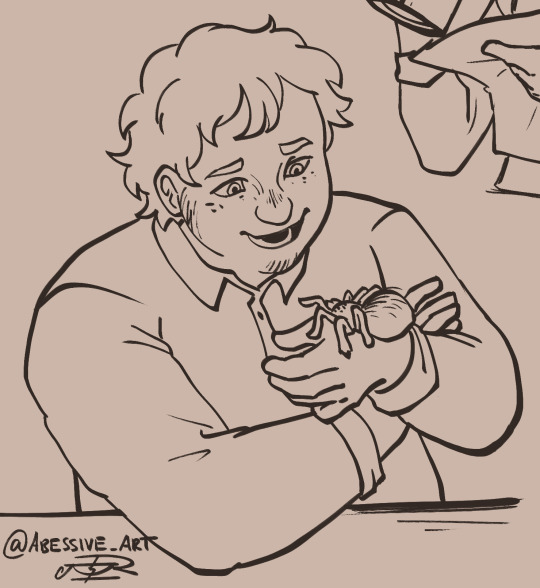
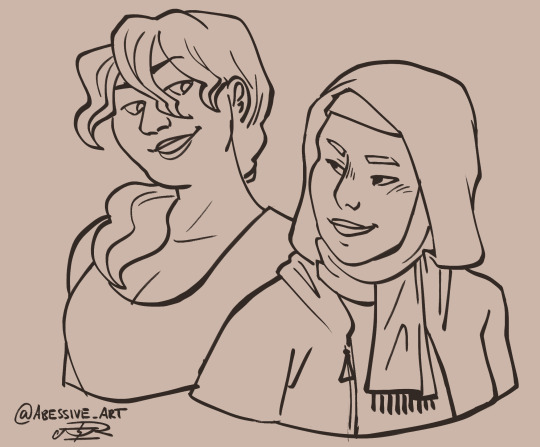
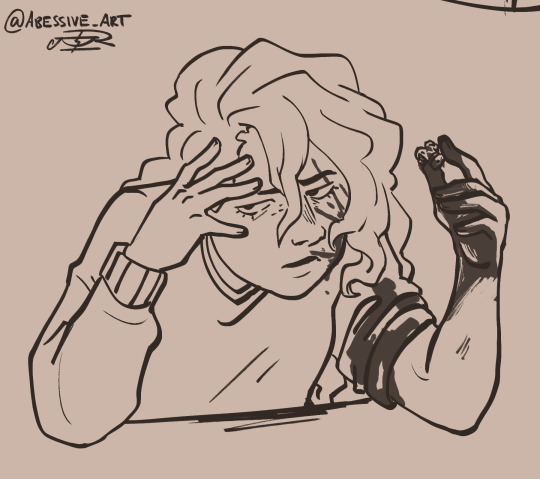
*Archives your Magnus*
#the magnus archives#tma#jonathan sims#martin blackwood#melanie king#basira hussain#daisy tonner#fanart#alice tma#tarantula#PLEASEEEEE PLease please please I love them so much this relisten is wrecking me#messing with my brain so bad i start thinking about tma and my heart n brain get scrambled#(i am very normal about media)#This podcast means sm to me :´) im so glad I came back to it <3#I have nothing new to say about the podcast i.e. literary analysis but oh man i am enjoying the hell out of it#makes me feel happy#myart
2K notes
·
View notes
Text
Viktors Disabilities, a Speculative Analysis
Ever since i first watched Arcane i have wanted to know (and i mean this in the nicest way possible,) what was wrong with Viktor. His disability was never explained beyond “he was born with a malformed leg”.
And so, i was left alone in the house with my thoughts today so i took it upon myself to figure it out, (and talk about his medical issues so i can ignore my own lmao) and i am releasing my thoughts upon yall!
(disclaimer: yes i am aware that this arcane is a fantasy world that is not our world and the disorders/illnesses and treatments will not be the same but the issues he has have to be based off of something (especially with how detailed this show is and how many references are made throughout.) this is not me trying to say that he definitively has any of these conditions, i’m just comparing them to conditions that exist today and suggesting what Viktors disabilities may have been based off of.)
(disclaimer pt 2.: i have not played League of Legends, i do not intend to play League of Legends, i have only watched Arcane and i am only talking about Arcane and Arcane lore and what i have been able to figure out from watching Arcane and spinning it around in my brain like it’s in a microwave.)
Now, i think i’ll just start from the beginning, and go in order of development.
1. Viktors Leg
According to the wiki (and about every other site that talks about Viktor) he is said to have been “born with a malformed leg”, and said pretty much nothing else. Now, when Viktor is an adult, his leg appears to be very not-malformed, so, let’s start at the flashback.
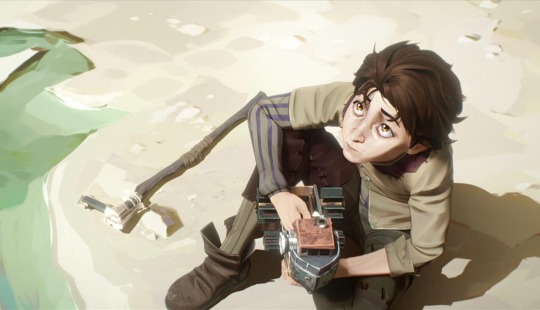
Now, even in the flashback Viktors leg looks normal. It’s pointing forward, and looks totally fine. But as the clip goes on, and he gets up and starts moving, the problem becomes apparent. Here’s a clip:
Yall have probably already noticed what i’m talking about with this clip, but i want to illustrate it more because the clip moves so fast:
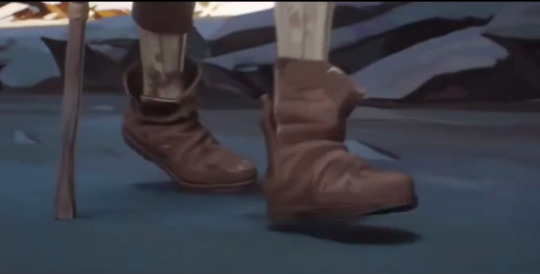
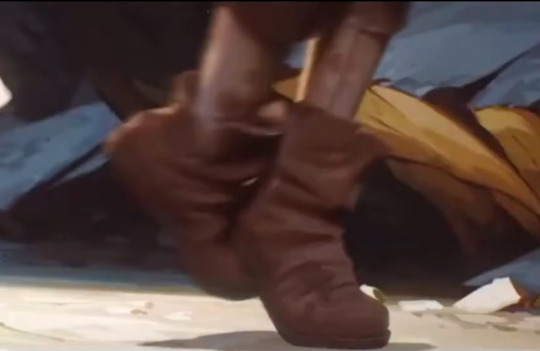
As Vikto moves faster, his foot shifts inwards! It shifts inwards pretty severely (i mean, he full on trips on it), and the only time in this entire clip where it is doing so. And that is because the other times he is around someone else. I think he is purposefully pointing his foot forward and in turn walking on the wrong part of his foot (balance issues), and more than likely causing himself pain 1. to appear less ‘crippled’ and more “normal” to other people, and 2. because clearly, his foot is pointing inwards to a degree that is impairing his ability to walk.
Now to me, (and i’m not a doctor so if any actual doctors want to call me on incorrect information please do so!) this looks like Femoral Anteversion, or a twisting of the femur that points the knees inward (it’s typically found in both legs but it can happen with just one)
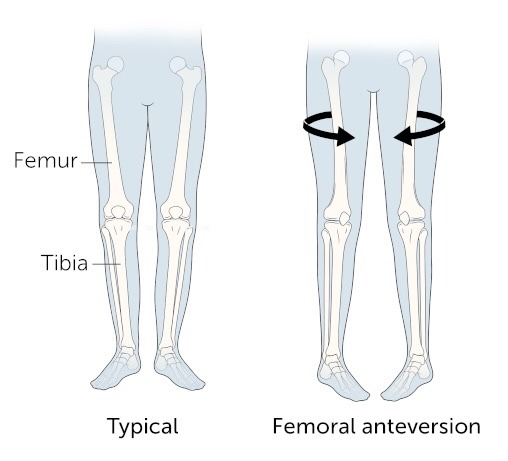
Now this isn’t necessarily a terrible thing, ~10% of children are affected with Femoral Anteversion (or “pigeon toes”), and most of the time it resolves itself, unless it is super severe, at which point it requires surgery to fix it. Which, of course, Viktor did not have access to.
Now, his leg does appear to be normal as an adult, but the femoral anteversion thought is still plausible. There are 3 reasons i can think of for this one.
1. He got to Piltover and after a little bit Heimerdinger noticed how messed up his leg was and Viktor got the surgery to correct it as much as possible (it’s implied that Viktor was in Piltover for years, based on how he acts and the fact that he’s Heimerdingers assistant) (this thought doesn’t seem very plausible to me, i don’t remember seeing any surgery scars on his leg in the hexcore scene, but it is a possibility.)
2. He’s simply just still correcting his leg. The reason we wouldn’t see him mess up like we did in the flashback is that he’s about 24-25 in act one, and i’d say that 14-15 years is probably enough to get used to doing that sort of thing.
3. (Honestly this one seems to be the most plausible to me) His leg has (partially) corrected itself. Most children whose femoral anteversion fixed itself had normal gaits by age 8-10, but that’s an average age and those typically aren’t perfectly accurate to everyone (i have. very personal experience with that.) and it makes the most sense to me that his leg has mostly/partially corrected itself and he’s just also continuing to self-correct to avoid appearing any more disabled than he already does (he shows quite a bit of internalized ableism throughout the season, and his line about people not listening to him because he’s “just a poor cripple from the undercity” really drives it home for me, honestly.)
2. Viktors Deterioration
When we first truly see Viktor in act 1, he seems lively, and unless he’s actively walking, he’s not using his cane, not really (he hangs his cane on his arm to read a book with both hands (really great rep btw, we do in fact do that!), he leans it against a desk to pace in front of a chalkboard with Jayce, he puts it down somewhere to go help Jayce with the experiment, etc.).
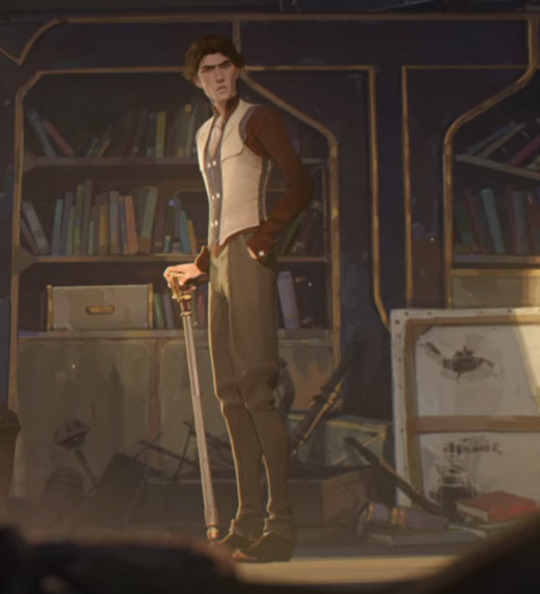
I mean, look at his stance, he’s not really leaning on his cane for support, more likely he’s using it for balance, and as an assist to his bad leg, rather than an attempted replacement like we saw in the flashback.
But in act 2? Hoooo boy
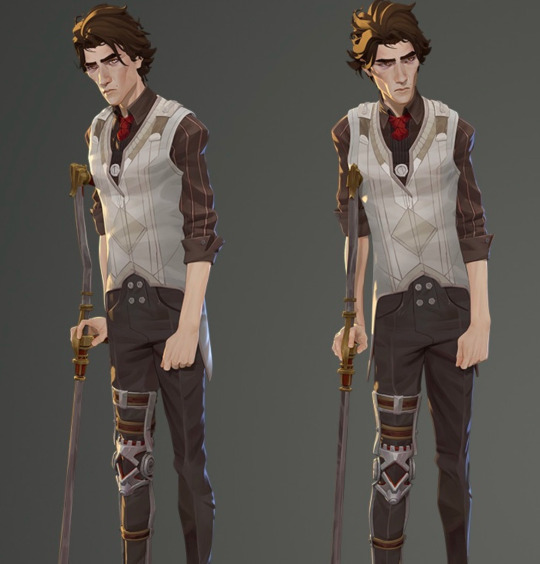
Look at that, beyond just looking 10x sicker, look at his posture, his shoulders specifically. He is actively leaning on his crutch (because he needs a crutch now, the cane wasn’t enough), using it like a replacement. Now, over the course of the ~7 year time skip, Viktors condition has deteriorated enough that he 1. needs the braces 2. needs a crutch 3. can no longer even get up without his crutch, let alone take a single step!
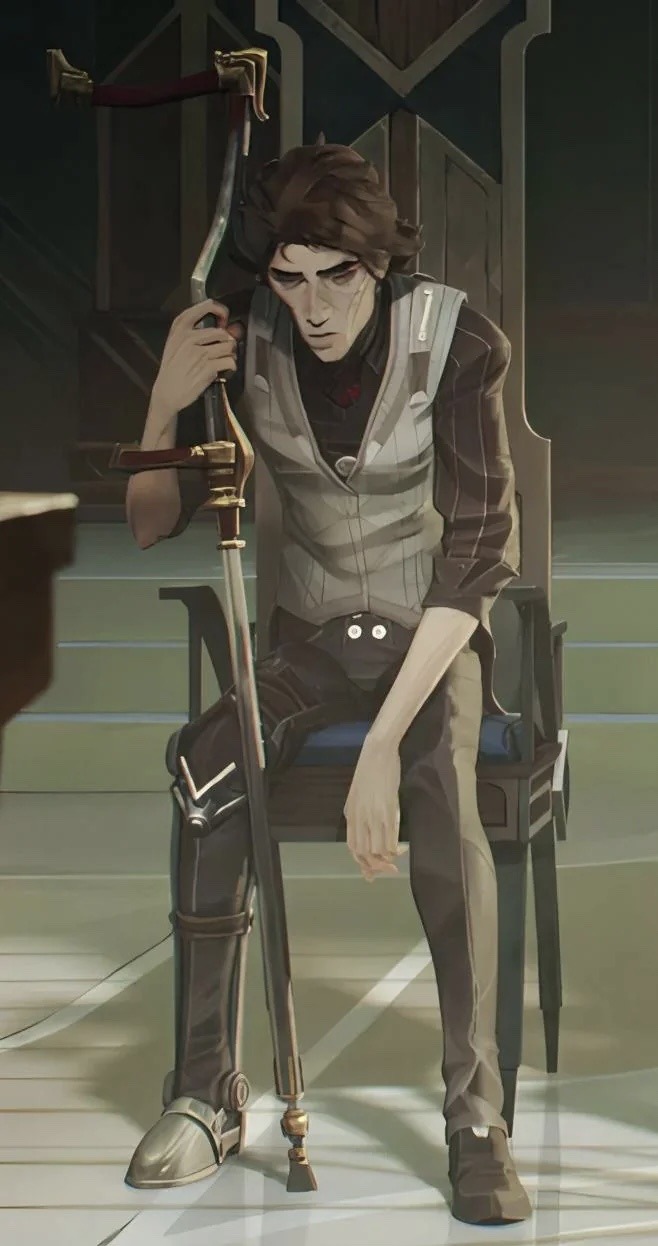
i mean, even when he’s sitting down, he’s holding onto it, leaning on it. The way he uses his crutch, how skinny he’s gotten, how much more tired he seems, all of these things say some sort of newfound muscle weakness, but why?
And the braces. Let’s start with the leg brace, since it’s right there. How it’s built around the actual leg and knee looks a whole lot like a much cooler unloader knee brace, or a knee brace that redistributes weight away from the weakened knee. I have to wear one of those when my knee gets really bad in the winter, when it starts buckling randomly and just.. not working. Which makes sense for the muscle atrophy/weakness theory i have, because that leg was already weak to begin with, and his knee would have been all kinds of fucked up if he did spend basically his whole life misaligning it like i’m thinking he did. (and to support that theory even further, the way that the brace goes over his foot as well reminds me of the braces some children wear to attempt to correct their ‘pigeon toes’ (which have been proven not to work, btw)
Now, the back brace. I’m gonna be honest, this part took me the longest, it truly confused me.
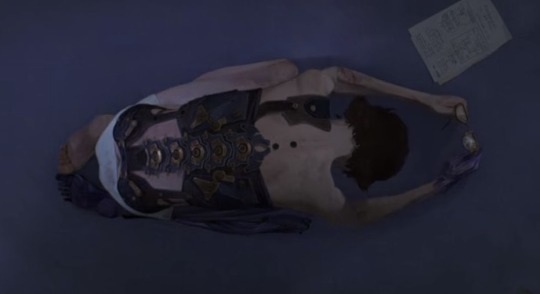
When you look at it, it just looks like a thoracic back brace, with some extra support on the hips (once again, pointing to muscle weakness)
But the thing that really confused me?
The screws in his back.
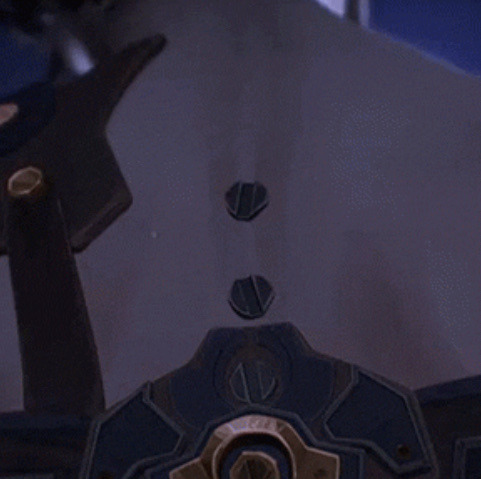
It took me an embarrassingly long time to figure out what procedure this was referencing (Percutaneous Pedicle Screw Fixation (i’m like really sure that the screws aren’t showing in the real life surgery but the fact that they are makes sense with Arcanes style)), and an even more embarrassing amount of time to realize that the golden screws in his brace weren’t connected to him. (i am. very tired.)
But essentially, a Percutaneous Pedicle Screw Fixation is a less invasive spinal fusion procedure. Now a spinal fusion can be done for many, many reasons, but only one really fit.
Support, because of muscle weakness.
Every single thing that got added on to Viktor could be explained by muscle weakness, but there’s never any explained reason why he was so weak all of a sudden. His terminal illness is cited as a reason but that didn’t really make sense to me, all of these procedures, all of these mobility aids made perfectly to his measurements would’ve had to have been caused by something with a much slower onset than the illness would have given him.
And after literal hours of scouring, i have a theory.
Post-Polio Syndrome.
The timeline makes sense, Viktor would have most likely gotten sick before the flashback, when he was a child (a lot of children who get Polio fight it off without even knowing they have it). Viktor is estimated to be about 32 in act 2, and the average time between the initial Polio infection and Post-Polio Syndrome onset is about 20-40 years (inconsistent numbers).
Now some of the symptoms we have no way of knowing if they affect Viktor or not, but the main ones that caught my eye were muscle atrophy, chronic fatigue, and, you guessed it, muscle weakness.
Given where Viktor lived as a child, and how heavily polluted it was (remember that Viktor was in the undercity over 10 years before we saw it in act 1 with Vi and Powders childhood), it’s not too far of a stretch to say that he could have contracted an illness very similar to Polio as a child, and only really be feeling the affects of it now.
3. The Illness
I have 2 main theories for Viktors illness, the first one seems to be the most popular among the fandom: Tuberculosis.
If you’re unaware, Tuberculosis (TB) is a sickness that mainly affects the lungs, with the main symptom being coughing up blood. Now this is a really good theory imo, it fits pretty well, with some of the other symptoms being muscle atrophy, fatigue, malaise (general feeling of discomfort/unease with no discernible reason), loss of appetite, and severe unintentional weight loss. all of this sounds like our guy, no?
TB can take weeks to be symptomatic, so we probably just caught Viktor at the worst time ever lol with this theory.
My other theory is actually one my friend suggested to me, and that theory is COPD.
Chronic Obstructive Pulmonary Disease (COPD) is a progressive disease that is basically a terrible combination of chronic bronchitis and asthma that can be caused by exposure to pollution (Viktor grew up in the Undercity before Cassandra’s vent system, i mean the river he was playing on had an oil slick on it, i think it’s safe to say he was exposed to some pretty severe pollution as a child.)
This theory makes a lot of sense to me, because it’s said in the show that his illness was probably caused by the air where he grew up, which this would have been, while TB would not. (not 15-20 years later, at least) COPD, once it reaches stage 4 is very severe, any flare up of symptoms could be life threatening at that stage, and the symptoms? Fatigue, shortness of breath, coughing, weight loss, and less frequently, coughing blood.
Anyway, i guess that concludes my analysis/comparison? I’m gonna repeat that i’m not definitively saying that ‘he has this condition and this is why!’, i’m just analyzing and speculating on what different parts of his disability is based on in real life. So, let’s just all be nice, yeah? (also PLEASE feel free to use this as a reference point for modern aus and stuff!!)
i do genuinely think that Viktors disease progression and his deterioration is one of the best examples of chronic illness that i have seen in media, in my experience (both with my own issues and what i’ve seen in other people) and Viktor himself is one of the BEST representations of what it’s like to be young and disabled and the internalized ableism that comes with it (if anyone wants to hear about that i will happily yap your ear off about it!
Anyway, for real this time. Yap session over.
[edit: if you like this you should look in the reblogs there’s a couple of really good in-depth deep dives from others that build on this!!]
#also i am 100% behind the hc that Jayce designed and built Viktors aids#viktor#viktor arcane#arcane analysis#arcane#arcane theory#media analysis#disabled representation#viktors disability isn’t talked about enough :(#viktor arcane i adore you#AUGH I LOVE HIM SO MUCH IM SOBBING
695 notes
·
View notes
Text
Ideology of Exceptionalism and Gravity Falls; meta and character analysis

I had a whole ago read a post by @icanlife that had a quote by Alex Hirsch on Ford's greatest flaw, and wanted to explore what the flaw is, which is the ideology of exceptionalism; in the exploration, I’ll touch on what it is and how it is used in abusive relationships and cults, as well as how it drives multiple Gravity Falls characters and consequently how it impacts relationships between these characters, and how the show ultimately refutes exceptionalism.
Quick note here; I am not in any way, shape or form a psychologist nor have any formal training in psychology; this is written from my own experiences with this ideology and my own forays into psychology and trauma-informed learning. It is also written with a loose understanding that is likely not broad enough to cover all references to cults, extremist groups and abusive relationships.
The Ideology of Exceptionalism
First of all, we have to get through a drier bit, which is… what is the ideology of exceptionalism and how does it arise? Might be fairly obvious, but it is the belief that you are, or belong to, a group of exceptional people, thus more important and worth more than anyone else; ie, those who don't qualify as 'exceptional'. It is often a subconsciously learned ideology. Now, what qualifies one as exceptional can be extremely varied; generally it revolves around something that provides some form of privilege. Thus, it might be, as the main exceptionalist idea in Gravity Falls, 'intelligence', or power, or it can be such things as attractiveness, quantity of money one has, species, nationality, or skin colour and ancestral heritage. The ideology of exceptionalism, being by nature hierarchical, devalues, and at its worst, openly and violently dehumanizes those who do not qualify as exceptional.
For why exceptionalism occurs is an extremely broad topic, but I've personally found that, for exceptionalism revolving around intelligence, it's a result of a poor sense of self-worth, and having one's self-worth tied to what makes one exceptional. Poor self-worth itself (again, broadly) is a result of childhood trauma from a lack of positive affirmation and unfulfillment of the emotional needs of the child. Meanwhile, self-worth becoming tied to the quality of exceptionalism generally is a result of when positive affirmation was pretty much solely provided around their 'exceptionalism', especially when provided derogatory commentary, or a blatant example of how they would be treated if they aren't 'exceptional'. As a result of the general lack of affirmation, self-worth then becomes often solely reliant on the qualities of exceptionalism, as that is the only way for the child (and later, adult) to get affirmation of their worth, as well as out of fear of being ‘not worth anything’ like the examples of ‘non-exceptional’ people they have been given.
This is especially likely to occur when the child is a social outcast; the adoption of the hierarchical ideology of exceptionalism, and the devaluation/dehumanization of others often occurs subconsciously as an avoidance/minimization tactic from pain. This is to say, the child, and later the adult (if healthy self-worth is not established) goes 'it doesn't matter what the non-exceptional people say or if they accept me since I matter more than them because of my exceptionality'. It can even be taken further, that being shunned is part of one's exceptionalism, and becomes part of the qualifier of being exceptional. For instance, 'they just can't understand because they aren't exceptional and that's just a part of being exceptional'. This idea also neatly tailors into the part of the concept of being better then others means you are separate from others; this can be taken that someone who is special, needs to be alone to be truly special.
Obviously, exceptionalism is not a healthy coping mechanism for poor self-worth, as often such people constantly feel the need to prove and show off their exceptionalism to gain that affirmation and avoid rejection, which is stressful. As well, it often negatively impacts their relationships with other people as a result of the arrogance of believing that they are better than most others, or even deliberate sabotage due to their arrogance. This occurs as they flatten the complexity of human experience to black-and-white hierarchical categories of exceptional/not-exceptional through constant judgement of those they meet, and often refuse to engage with people who don't belong to their 'exceptionality', or even people they simply don't like, even if they technically qualify. Generally, those that they do like or have close relationships with, often due to being similar, are automatically labelled as 'exceptional'. Those judged as ‘exceptional’ also become privy to the open judgements of ‘non-exceptional’ others, out of a subconscious belief by the exceptionalist that the other believes similarly; something that may strain their relationship if the other doesn’t ascribe to exceptionalism. This all culminates in the exceptionalist being blind or even adverse to the diversity of experiences, which makes it difficult to create relationships and community outside of echo chambers of their own beliefs (if they can even find this), and subsequently, these people are often isolated and have very few to no close relationships with people.
However, all humans require connections with other people, relationships where one can rely on others emotionally and physically if needed and feel accepted; they also require to feel like they are worth something, that their life has meaning. Lacking meaningful connections and having a crippled sense of self-worth, a deep yearning hole is left in these people. Exceptionalism, especially as it is a narrative constantly pushed by Western society as it validates hierarchies, is then employed as a (often subconscious) trauma response to assuage this yearning hole, with arrogance and denial. And depending on the circumstances, it can be a very strong and definitive trauma response for people.
This isolation and lack of self-worth is catnip to abusive relationships, including cults and extremist groups. These types of relationships often heavily rely on isolating their victims or pulling them into echo chambers of solely the abuser’s rhetoric, to redefine what is healthy through gaslighting; as the exceptionalists are already isolated, this makes them extremely susceptible. They also often provide these people affirmation, and in these cases especially about their exceptionalism, thus confirming their self-worth, their 'specialness', while also providing them the connection they have been lacking, either through the cult community or through the abuser’s own presence. These emotional needs, which haven’t been met in a long time, if ever, begin to be fulfilled; something that abusive relationships and cults hinge on, rather than any form of logic.
Ideology of Exceptionalism and Gravity Falls
The main characters within Gravity Falls which are heavily ascribed to exceptionalism would be both Ford and Bill; this characterization deeply impacts the story and their relationships with others (technically the Northwest are another case regarding wealth, but less directly impact the storyline and thus tangential; Gideon also is an example, but as a mirror of Bill). With each of these characters I’ll go into detail within their sections on the way they began to ascribe to exceptionalism, and how it plays out later in their relationships; I will first begin with Ford, then move to Bill. Then, to cap it off, I’ll go into the characterization of Stan and the way Gravity Falls refutes exceptionalism.
Ford and Exceptionalism
Firstly, the quote from Alex Hirsch that kicked this whole baby off, as mentioned previously;
“Ford sees Dipper as someone who’s special like himself. That’s Ford’s great flaw, his arrogance is he believes that there’s special people, and everyone else. That human attachments are actually weaknesses. And the song and dance that he’s giving Dipper right now, is the song and dance that he gave McGucket, back when they were younger… ‘You and me are different, we’re better than everyone else. We have a path that no one else can understand, and only us can do this.’ It’s a very seductive idea for Dipper… Dipper is a smart kid, but Ford’s projecting. Ford loves Dipper because he sees someone who’ll tell him ‘yes’ to everything. Who’ll never challenge him, who’ll do a really insane dangerous mission.”
Very blatantly Alex Hirsch calls Ford out on his arrogance in the belief that he is special, in his belief in the 'lone hero' complex, in his belief in exceptionalism. And really, it should be no surprise that Ford does so, considering the way he's depicted as a social outcast as a child (other than Stan), and the way his parents have been clearly shown to be not particularly emotionally supportive (“I’m not impressed”); they don't provide positive affirmation except for his intelligence (mostly due to the possibility of money making through it…), while also actively comparing him to Stan who is derogatorily ‘not-exceptional’, and ‘worth less’. This all sets Ford’s self-worth up to be fragile, and other than Stan who wholeheartedly accepts him, he is isolated and invalidated; plus, the only other validation he receives is around his intelligence. All very classically fitting the profile for exceptionalism.

Image id: Stand and Ford when they were children, both clearly enjoying each other's company.
Ford’s belief in his exceptionalism catalyzes after the shattering of his and Stan’s relationship. Previously the twins are shown to do everything together, having a very close caring relationship; something unlikely if Ford thought he was better than Stan. Also, when Ford is talked to about his opportunities, Ford looks uncomfortable at the way they talk about Stan as inferior, compared to how he himself is being praised; but in the offer he’s simultaneously finally being validated, he’s being told he’s someone worth something, and he’s going to be someone worth something after this. And then the science fair incident occurs, and Ford loses that validation from his parents, from the judges and a future of more validation; after being promised validation and acceptance, it slips through his fingers. And in his anger of being denied that, it becomes easy to begin to slip subconsciously into the rhetoric the others have been feeding him; that he’s exceptional, that Stan isn’t, and he deserved to be recognized for his worth. So he breaks the relationship with the only person who accepted and validated him for who he is. With that loss of previous support, Ford becomes then deeply obsessed with proving his exceptionalism to the world to assuage that fragile self-worth, to become accepted, or even better, revered, confirming that he is someone of worth, someone special, like he was promised.
Ford’s obsession also doubly functions as a way to alleviate his guilt over shattering their relationship; if he’s exceptional as he believes, then he’s within the right to respond the way he did, as he’s worth more than Stan, he's better off alone, and he has a right to be angry over being denied that validation. As well, in much the same way as it is used as a way to alleviate his guilt over the end of their relationship, it is also likely used in a way to minimize the pain of being ostracized (although not directly depicted); afterall, Ford’s keenly aware and insecure about his social ineptitude and his six fingers as things that make him different from other people, case in point with his experience visiting Lazy Susans Diner. Thus it wouldn’t be unsurprising if he uses the idea of being worth more than those who ostracize him to imply it ‘doesn’t matter’ what they think. His ostracization by nature keeps him from generally forming close relationships, with the exception of Fiddleford (who much like him, is socially outcast, and intelligent) during his university days. As a result, he's isolated and acutely lonely, having lost Stan.

Image id: One of the missing Journal 3 pages in TBOB, detailing Ford's botched social interaction in Lazy Susans Diner. In the background is the print of his six-fingered hand.
In his obsession over being acknowledged, Ford, like many others who believe in exceptionalism, identifies strongly with the causes of his ostracization (his intelligence, his six-fingeredness) as part of, or wholly, makes him exceptional. It is obvious through his choice of study; with the grant he has been gifted, he chooses to revolve his work around the weird, the outcast, something that you see Ford gravitate towards being an outcast and deemed 'weird' himself (which in Journal 3 he openly talks about). Something that can be, much like him, framed as 'exceptional'. His work is even recorded in a journal that Ford deliberately chooses to put his six-fingered hand on the cover of. Intertwined with the way it becomes adopted into the idea of exceptionalism, is the keen loneliness from his ostracization and a deep desire to be accepted and a wish to find a community of other weird people.

Image id: Two pages from journal 3, labelled 'Myself', in which Ford is open about being weird, and a social outcast, while also noting his ambitions and that 'Gravity Falls, [is] the place that I fit in.'
Ford and Bill
All of this culminates in Ford becoming an incredibly easy target to manipulate by Bill. He’s desperate to be acknowledged (and thus accepted) by an authority figure so that his belief in exceptionalism is justified and his self-worth confirmed. And he knows he’s intelligent, that he's exceptional because people have told him so, but he just needs to prove it with something that shakes the world. And the grant is finally his second chance after the fair, but he's stuck, and the research is going nowhere, and he's in a town where he doesn't really know anyone and he’s so terribly lonely. And sure, he clings to his exceptionalism but if he can't even prove it then is he really exceptional? Is he even worth anything like he thought he was? And what about what he's left behind, rejected, because of his exceptionalism?
And THEN he finds an incantation and he ignores the warnings because maybe, just maybe, this will be his break to get that acceptance/validation he has been chasing his whole life?
And then it's better than that.
A god, essentially, shows himself to him, an ultimate figure of authority. And he tells him that yes, he is special, he’s worth more than other people, and Bill’s only showing himself to Ford because he is so much more intelligent than anyone else. Ford is suddenly getting his exceptionalism confirmed by a god of ancient knowledge, an immensely intelligent interdimensional being, and he’s also showering him with affirmations, specifically affirmations around what Ford's fragile self-worth is based on. And even better, he's delighted by Ford's six-fingeredness; he's not put off at all, it even becomes his main nickname for Ford, just like it used to be for Stan all those years ago. On top of it all, Ford's own social ineptitude doesn't phase Bill, another thing Ford is self-conscious about; Bill's own social ineptitude as he's not human probably makes Ford feel comfortable, knowing that's not expected from him.
Through Bill, not only does Ford find someone who validates his self-worth through intelligence and even confirms to him that his weirdness is part and parcel of making him special, he also finds someone who he regularly (generally) is in contact with, who enjoys talking to him and even banters with him familiarly. Hell, Bill even deliberately goes out of his way (literally possessing a whole wack ton of rats, then dream karaoke) to celebrate his birthday with him; how long do you think Ford has simply skipped his birthday since he had no one to really celebrate it with? The loneliness, beneath his arrogance and belief in exceptionalism, is being fulfilled; for the first time since Ford was a teenager, he's fully accepted by someone, social awkwardness, six fingers, exceptionalism and all.

Image id: One of the lost pages from Journal 3 in TBOB, the 'one thing led to another' page, with Bill and Ford singing karaoke and drinking together, both clearly enjoying themselves; Bill has an arm slung around Ford's shoulders.
So it's really no surprise at all that Ford fell for this, hook line and sinker. Hell, if I was in Ford's shoes I would fall for it just as hard. And I've seen a few posts floating around talking about how Bill is bad at manipulating, and no, he's not. He was able to pinpoint exactly what Ford wanted and needed, and provided that, was charismatic enough to provide that. Again, manipulation isn't about logic. It really isn't; it's about the emotional core in people, what people lack and what you can give them to slowly reel them in to sing your dance and song. And people will ignore vast swaths of red flags when you're finally being accepted, when you're finally getting your emotional needs met at least in some way or form. It's better than not having them met at all, such as previously. So Ford worshipping Bill is really not a surprise, especially as Bill deliberately stoked it.
All of this is part of why you see Alex Hirsch call Ford's belief in his exceptionalism his greatest flaw; because it allowed him to be very easily manipulated by Bill, and by its nature kept Ford isolated from others, evident by his arrogance in assuming he knows best and refusing to see other people who aren't as 'intelligent/weird' as him as worth getting to know, listen too and even reach out to ask help from, it's him believing he has to be the lone hero as someone whose 'special'. It's something that blinds him to the danger of his work around the weirdness of gravity falls because he’s desperate to seek a place where he and his weirdness belong, and it's something that plays out in each and every relationship he has because it's something he clings to so deeply. It's what cost him his relationship with Stan, who previously accepted him completely, and, as he's disinclined to form new relationships and as Bill actively strokes his paranoia (Trust No One…), ultimately further increases the hold Bill has over him. It's only Fiddleford’s presence as he works with Ford that allows him some form of outside reference and reprieve from solely Bill’s influence, something that Bill resents deeply and is clearly jealous and angry about, even if Fiddleford is helping create the portal. And it's ultimately Fiddleford, once he was aware enough of what was happening, calls Ford out on it, seriously jeopardizing Bill's influence over Ford; but Ford is too invested in the portal, in chasing his own ambition and caught up in Bill’s manipulation to take him seriously, until the incident with the trial, and Ford beginning to hear other voices then Bill.
Ford’s Exceptionalism and Wider Relationships
Now back to how it plays out in all Ford's relationships; we've already gone over it with Bill's influence, because it made him extremely easy to manipulate, and with his disregard of Stan in favor of validation of his exceptionalism. But Ford, as pointed out by Alex Hirsch, also exerts the ideology's seductive rhetoric to both Fiddleford and Dipper (who look up to Ford) in a similar way that Bill does with him (although there is a difference of it being used intentionally and maliciously, compared to subconsciously and earnestly, even if it is problematic). Ford, with his black-and-white view of exceptionalism, sees both Fiddleford and Dipper as people who are like him; 'exceptional', and so he treats them as such, and uses this rhetoric to coerce them into helping him.
For Fiddleford, the lure is how he can change the world, how he can be finally acknowledged if he helps Ford with the portal. And it works well; he willingly chooses to leave his own work and his wife and young son, to work with Ford. Much like Ford, Fiddleford himself is also a social outcast and regularly presumed less smart than he is, and he’s got a chip on his shoulder to prove himself, to gain acknowledgement and recognition from the world at large. Although Fiddleford has a family which presumes he’s not entirely lonely like Ford is, he also clearly has deep feelings for Ford, some which are hinted to be more than just ‘friendly’ feelings; it is likely the combination of the lure of validation and spending time with Ford, a kindred spirit that accepts him and an old friend/crush, that causes him to agree (afterall, it was Ford who made Fiddleford feel accepted and choose to stay at Backupsmore). And Fiddleford’s not even considered a partner, but rather an assistant to Ford due to Ford's arrogance, and he still drops everything to go! It’s more about their relationship and connection rather than validation, but that doesn’t stop Ford from espousing exceptionalism. And this is a distinguishing difference, because although Fiddleford would like recognition, he’s not there solely because of it; he’s not a believer in exceptionalism nor arrogant about his skills, and so, unlike Ford who is blinded by his obsession, he’s much more aware of the dangers of the weirdness of Gravity Falls. Thus, he's actively calculating the risks involved, and when he realizes there could be potentially devastating consequences of the portal, he attempts to talk Ford out of it; this fails due to Ford’s own denial and obsession over the portal. In the end, it all goes terribly sideways, and Fiddleford ends up losing everything he had; his wife, his son, his friend, his memories and himself to the trauma he had experienced at the invitation of his friend with the lure of validation and company, due to the memory gun he had created himself.
As for Dipper, much like Ford, he also has issues with self-worth (many of the episodes deal with Dipper finding self-worth; ie, the manotaur episode), has a physical oddity (his birthmark) and by far the trait he relies on most for worth is his intelligence (for example, in one episode he rubs it into Mabel's face over and over again in beating her in games). He's also extremely desperate to be recognized by authority figures as someone intelligent, case in point when he summons the dead after being made fun of by the government agents to try and show them that the information he's gathered is important after Stan dismisses his knowledge. This desperation to be seen as someone of worth from Dipper, much like Ford, extends to the need to be a hero, something he even says at the end of the zombie episode; yet, due to Mabel, unlike Ford he's not a lone hero, and Mabel also half the time acts as the hero.

Image id: Zombies crawling out of a crack after Dipper summons them; Dipper and the two agents look on in horror.
It all culminates in Dipper hero-worshipping Ford when he returns; really, no different than Ford worshipping Bill. And Ford clearly finds it extremely flattering; Dipper's attention and amazement of him feeds his exceptionalism. Exactly how Ford responded to Bill, Dipper is willing to do anything for Ford, excited too, in an attempt to impress Ford and be validated and accepted. And for Ford, that's an extremely heady feeling, especially as someone who has been constantly alone the last 30 years, especially when he had one previously confirm his exceptionalism all those years ago and stopped, and now someone is once again affirming that idea. And Ford doesn't have to be alone again, because he's found a kindred spirit in Dipper as his assistant, someone ‘just’ like him, someone who is exceptional. Because he sees himself in Dipper, he begins to espouse exceptionalism unconsciously, by praising Dipper's own intellect and adventurous spirit, assuaging his feeling of self-worth, while also telling him he's more important or better than others because of it.
And it's seductive to Dipper, because he wants to hear those affirmations of his self-worth, especially as he hero-worships him, but Dipper isn't sold on it, because it means leaving Mabel behind, it means believing that he's worth more than Mabel (and also, Stan, and all his friends he’s made in Gravity Falls). It's ultimately because of his relationship with Mabel that he rejects the ideology; he's not isolated the way Ford was with Bill, and he's not willing to break that relationship for that acknowledgement, because his relationships matter more to him.
Bill and Exceptionalism
Now of course, that's only on the Pines; what about Bill?
While it's obvious that Bill uses exceptionalism as a main manipulative tactic, it's not just an ideology he sprouts emptily; it's also an ideology he believes in, just like Ford, although it's less based on intellectual exceptionalism, and more on power and 'weirdness'.
This most distinctly can be seen in Bill's denial about what happened to his home dimension; Bill's belief in his exceptionalism occurs as a pain avoidance tactic from killing his whole dimension. Bill was clearly a social outcast within his dimension due to being able to see 3d; he's not accepted, and not trusted, to the point that there is medical intervention to make him blind. That's a deeply traumatic experience that completely erases one sense of self-worth, where one’s sanity is called into question by your parents on something that is not harmful, that's beautiful and you just want to share with them. It's a deep and clear rejection of who Bill is, and his ability. As a result, out of a desperate bid to be understood and accepted, he ends up trying to show them the stars. And it ends up killing everyone.

Image id: Page of TBOB, on 'The Early Years' which notes that Bill was an oddity for seeing 3d, something that was illegal to speak about. Bill frames it as something that made him 'special' and better than all the others.
Traumatized, and originally rejected by the dimension, he instead weaves an excuse of exceptionalism; that it doesn't matter what he did to them because he's exceptional and he's worth more than all of them because he can see 3d, because he's powerful, so he shouldn't/'doesn't' feel any remorse about it. With such a traumatic result of trying to be accepted by people, he rejects the idea of trying to be accepted for who he really is; instead adopting a facade of a monster that he believes he is (and eventually, becomes).
Even if he clings to the delusion of exceptionalism, and shuns attempts to find true acceptance, he still wants it; and that's where his henchmaniacs fit in, as they're all, as Bill's noted when trying desperately to get Ford to join him, weird; each has something 'wrong' with them, which is why Bill accepted them as his lackeys (although it's not like we know the context around these). It's a surface-level acceptance however, one more predicated on fear than emotional acceptance. He's taken his 'weirdness', much like many do who believe in exceptionalism,as ‘part of what makes him exceptional'.
In the same way that Ford wants to show the world that he's smart and intelligent by building the portal, Bill does so by wreaking havoc and taking over existences as a way to show the world that he's powerful, that he's someone to be reckoned with, that he's not someone to be ignored because he's someone who's worth more than others. If you can't be loved and accepted, then being hated and feared is better than being ignored; acknowledgement at least approaches acceptance, it's validation of some sort of worth. It also functions as deliberate self-sabotage of his morals, by proving that he is the monster that killed his entire dimension; if that's what he is, then that's who he's going to be, because if he wasn’t, then he has to come face to face with his remorse over what he did to his dimension and his whole house of cards around his exceptionalism and not caring collapses. So instead he keeps feeding the delusions the denial, and lies and lies and lies and keeps lying to ignore all of it, to wrap himself in this shroud of exceptionalism and brutality as a way to function. And it somewhat works, because he's mostly deluded himself about it all, even if subconsciously he knows.
And of course, this display of Bill's exceptionalism is what brings Bill to earth, to Gravity Falls, and to manipulating humans. In meddling with earth and humanity, beyond Bill's goal of taking over earth and fleeing his own unravelling dimension, he also enjoys reaping the benefits of being worshiped by humans, who find him awe-inspiring. Their amazement of who he is, and Bill's own posturing and manipulation of people leads to Bill literally forming cults (ie ciphertology) or having apprentices that worship/find him (to varying degree) inspiring; all reinforcing his feelings of exceptionalism.
Of course, Ford numbers among these people; he praises Bill and worships him, as he's played like a fiddle by Bill, because his self-worth and belief in exceptionalism is fucked up in a way that perfectly resonates with Bill’s. Because it's the exact same types of issues around self-worth, around being an outcast, being weird and wrong physically, and yet at the same time gifted. And Ford clearly is incredibly lonely and yearning for acceptance, but so is Bill; since the beginning he's been trying to find someone who would accept him, even if he's given up on it. And for his song and dance to entice Ford in, he pretends he's not crushed dimensions for fun, that he's not a 'monster'; a version of him he buried after he had tried to show his parents the stars, one that he occasionally resurrects and puppets around for manipulation (all lies are better when they have a grain of truth). And this version of him is worshipped, but above all is accepted, is loved by Ford. The softer parts of Bill, even if they are still weird as fuck, the parts that were never far beneath the surface for all his deluding, become loved by Ford. Much as Ford becomes hooked on Bill’s praise, Bill also becomes hooked on Ford's genuine love and care. It becomes personal, unlike any previous ‘inspirations’ and Bill over time gets to the point that he feels accepted, safe enough with Ford to share about his dimension much more close to the truth then he did with any of his henchmaniacs. He becomes vulnerable with Ford, in response to Ford’s own vulnerability with him. He’s finding acceptance for the first time in his life around the softer parts of himself, not just the feared acknowledgement that comes from his dimensions conquering; much like Ford is finally finding companionship and acceptance with Bill, not just only intellectual validation. Bill's also for once, not just self-serving; he cares, and goes out of his way to take time with Ford, even celebrating Ford's birthday (in the unique way he does things), both with the rats and the karaoke.

Image id: One of the lost Journal 3 pages in TBOB. Ford recounts Bill talking about the destruction of his dimension, and calls himself by implication a monster.
They're both fulfilling each other's emotional needs, needs which both of them have struggled with most, if not all of their lives (although their relationship is certainly not healthy, considering it's codependent as fuck, riddled with exceptionalism and oodles of power imbalance issues). And suddenly, against Bill's plans, Ford's no longer just a disposable pawn, but someone Bill wants as part of his team, someone by his side, closer than his henchmaniacs are. He's unwittingly fallen for Ford, and so when everything goes sideways in his plan, and Ford swears it off, suddenly cutting off their relationship and that acceptance Bill had finally felt, he spirals into grief and anger from the rejection. As a result, he becomes extremely abusive to Ford in desperate attempts to continue their relationship, and ultimately he becomes obsessive over Ford joining him again as Ford continues to refuse, as evidenced by both Weirdmageddon and the Book of Bill.
Stanley Pines, and the Refuting of Exceptionalism
Exceptionalism, being a negative driving factor behind many core character dynamics, is ultimately refuted by the show. This occurs multiple times over the show, such as with Mabel in the Pioneer Day episode, especially compared to Pacifica, but mostly through Stan's characterization. Stan is someone who has been since the beginning characterized (if lovingly so) as someone who is a failure by societal standards; he’s an older man running a run-down tacky tourist shop to swindle gullible tourists out of their money, has multiple divorces, has an ongoing feud with a literal 12 year old, clearly has had multiple mishaps with the law (some ongoing), is generally pretty self-serving and is extremely lonely and really had no close relationships until Mabel and Dipper showed up. He's not exceptional; he's not even what we would consider 'decent' enough to have a 'typical, hard working job’. In short, he’s a failure, a stark difference to the idea of 'exceptionalism' that characterizes Ford. If he's gifted in any area, it would be charisma (debatedly), not anything else.
But it's still Stan who rebuilds the portal from literally only one journal (not all three!) and gets it to work. It even seems like he only needs some codes from the other two journals when he does get them, suggesting that he was able to extrapolate from what was left and the first journal’s blueprints to fix it entirely, something that is extremely difficult and technically complicated (Ford, Bill and Fiddleford all worked on it together!). Stan's able to do it, even if it's been shown he's not 'naturally' gifted in that area. And it's something he does as a result of his deep care for Ford; because even after their fights, he cares about Ford and wants to right his wrongs, believes he should, because of his whole life of being defined as a failure and even worse than that, screwing up his ‘exceptional’ brother’s life. And he’ll do it even if that means learning how to build an interdimensional portal, even if it takes up thirty years of his life doing so, and he doesn't waver. Much of this is connected to his own complexes around being deemed a failure compared to Ford, having failed to succeed in his life, and how he feels that he needs to atone for screwing up Ford’s life, now for the second time; but beneath it all, he also cares. Much like Ford, he's extremely lonely, but he's not blinded by Ford's arrogance, and as a result he wants to make sure Ford's safe, because that's what he used to do, they’re twins, they grew up together, they once they had fully accepted and cared for each other, and dammit that still means something, and Stan hasn't found that depth of emotional connection since. So if possible, he wants to rekindle that closeness they had, but first, he needs to bring Ford back.
And in the end, it's not Ford's own special gun he built using his intelligence that 'kills' Bill. It's Stan, someone who Ford had long ago broke it off with in search of validation of his exceptionalism, someone who both Ford and Bill labelled as 'not-exceptional', who defeats Bill. It's exceptionalism's devaluation of people who are 'not-exceptional' that causes Bill to underestimate the Pines beyond Ford, and it's only when Ford put aside his exceptionalism and his refusal to accept and trust 'non-exceptional' people, that is, trust Stan once more, that causes Bill to end up defeated by Stan.
In the end, it's not about who's 'smarter'; it's a reminder that everyone has different skills and are better at different things, but that doesn't diminish one's worth or value, and that just because someone isn't naturally 'gifted' in an area doesn't mean they can't learn or use different ways to get around obstacles. Ultimately, it comes down to that no one is worth more or less than other people; exceptionalism is a lie. It’s a lie and an excuse, and it's certainly not a healthy way to assuage one's poor self-worth. What does matter is creating positive healthy connections with other people, and caring about them. This creates a community where you can be yourself and be emotionally fulfilled through these connections; and when opposition does arise, you become able to fight it together, and fight so much stronger than if you are alone.
And by the end of the show, you see that. Ford begins to let go of the ideal of exceptionalism and its black-and-white categorization; finally recognizes his own faults around prioritizing validation of his intelligence and exceptionalism over his relationships, and finally, after all the years, chooses to create and rekindle positive relationships with people, trust people, and make amends. And in the end, he goes sailing with Stan, prioritizing their relationship, finally fulfilling their childhood promise.

Image id: One of the pages written by Ford into TBOB. Ford refutes Bill's idea of happiness, and says he has finally found his own happiness, and it looks like the photo taped in, of Stan, Ford, Dipper, Mabel, Soos and Wendy, all smiling together.
TLDR: Exceptionalism, an ideology of categorizing people into being special and worth more vs plebian and worth less, is a trauma response and subconscious ideology that characterizes Ford and Bill’s lives, deeply impacting all their relationships as it is used to coerce people into doing what they want, makes Ford easily manipulated, and breaks relationships through their arrogance. It is ultimately denounced through the way Dipper chooses to reject Ford’s offer and his rhetoric of being exceptional, and through the way it's not Ford’s intelligence, but rather Stan, who has been labeled as 'not-exceptional' and a failure at life, that defeats Bill through trickery. It's a reminder that everyone has worth, and no one is worth more than other people, even if one may be gifted in certain areas; the ideology of exceptionalism is fragile and a lie. In the end, creating a caring, loving community around oneself is where strength truly lies, as is seen with the deep care and love the characters have for each other, and the repairing of Ford and Stans relationship.
Thanks to the lovely @eshtaresht who deigned to beta read this monster of a post for me
If you enjoyed this meta, (first of all if you read all this you're a champ!) I've also done another gf meta post! (It's shorter I swear)
#gravity falls#ford pines#stanford pines#bill cipher#stanley pines#stan pines#hugin rambles#hugin rambles gf#journal 3#the book of bill#thisisnotawebsitedotcom#billford#fordsquared#gravity falls analysis#gravity falls meta#book of bill#tbob#christ its so long whyyyy#also oh nooo i wanna do another thing but SPECIFICALLY on trust. gravity falls is ultimately about strength in community and hnnnghhhhh#that makes me wanna cry#also i had so many thoughts. also on the denial part of exceptionalism??? oh baby Bill fucking LISTS it in his book#like sir. please#anyways i love media analysis and im totally normal about all these characters#also like Fiddleford is. like. yikes man.#anyways uhm. does dropping a 6k essay post make me sexy? please say yes (i HIGHLY doubt it#sheesh who's got time to read all this... psssspsspspp theres PHOTOS that TOTALLY dont have more reading in rhem nawwww#i totally dont know what ur talking about mhmmm#if youre like is this about gifted kids- yes. yeah. i just didnt name it. its also about wider things but. yeah#also. unofficial title? Gravity Falls and Gifted Kid Issues an analysis#oh boy sure hope my post about gifted kid issues is a hit on the gifted kid issues site
700 notes
·
View notes
Text
something I think about a lot -- especially whenever the bit comes up about Bulma hooking up with Vegeta because he seemed lonely -- is how underrated and under-discussed Bulma's loneliness is too. She's not isolated in the same way Vegeta is, but throughout the series she presents herself as an extrovert, while struggling to make friends, displaying a deep frustration toward her relationship with her parents, and then the late-add lore that her big sister just up and left her whole life behind when Bulma was still a little girl, and kind of left Bulma to deal with their parents and their company and all the hard parts of growing up by herself.
The other thing is that Bulma's intellect is largely unmatched, especially in anyone her age. Even including her sister, she doesn't have anyone she can talk to about the things she's passionate about. She can't communicate all the stuff that goes on in her head, because nobody who cares would get it and nobody who gets it would care. Vegeta, due to being a highborn alien raised in a cutting-edge advanced society, is very likely the first person in her age bracket that knows and is actually interested enough in science to talk about it with her, and can follow probable logic well enough to not have his eyes glaze over when she explains something out of his depth. And, it's implied that it was not common in any of his demographics either -- Vegeta's intelligence was something Frieza had to remind even his highest-ranking men to remain on alert about.
All this to say, I think it gets read a lot that Bulma felt sorry for Vegeta and just wanted to fix him, but I don't think that's giving her enough credit as a person with her own life and experience. Rather, I think it's a really cool and interesting part of their dynamic that loneliness and isolation as a direct consequence of being Born Special(tm) is something Bulma can fully understand and empathize with.
#dbtag#media analysis#vegebul#I just chinhands I like them a lot your honor#especially because both of them are people who spent the first half of their story lashing out whenever their value was challenged#and once they got together that vein of insecurity slowly faded out from both of them#And I love the implications of that
583 notes
·
View notes
Text
Bcuz I'm the little bastard people refer to when they complain about how "the only thing fandoms care about these days is shipping 😒", here's an idea
Black Sapphire's mic is alive and emotes. Idk if it's mimicking his hidden emotions or if it's its own thing, but I'm just going to assume it's like a combination of both.



I think everyone is ignoring the possibility this has when it comes to Sapphire and Silverbell. Imagine Sapphire flirting snd being all suave while his mic is just being obvious and making heart eyes. Imagine Sapphire just normally greeting Silverbell when he sees him, but the staff is going all looney toons, "AWOOGA! HUMMINA HUMMINA HUMMINA" on him. Imagine Silverbell complimenting Sapphire and Sapphire graciously taking it, while the mic is just

DO YOU SEE MY VISION?????
#i can understand the annoyance of shipping but a lot kf analysis does come from shipping?#it's not like analyzing the media you see and shipping are seperate#i saw someone on pinterest complain about how the fandom boiled sk8 down to “gay skating show”#and it's like#no?????????#ive literally ONLY seen people talk about their ships through an analysis perspective#we KNOW it isnt the “gay skating show”#we know that is friendships and love (of all kinds) and identidies and learning to accept oneself#we KNOW that#people just combine that with their ships#aint nothing wrong with that. We aren't boiling it down to “gay skating show”#anyways this is a cookie run post so imma stop#black sapphire cookie#silverbell cookie#blackbell#blacksapphire#crk#cookie run kingdom#cookie run#cr kingdom
192 notes
·
View notes
Text

Gaslighter? I hardly know her!
[First] Prev <–-> Next
#poorly drawn mdzs#mdzs#wei wuxian#lan wangji#jin guangyao#qin su#The parallels to the mulderskully comic were genuine scripting coincidences that I kept in for the irony.#wwx and mulder both have a strong need to show their beloved (investigation) partner the cool thing they just found.#Much to their chagrin and concern.#For as much of a mess the plot gets in The Untamed...one of the things it does probably the best of all adaptions is setting up JGY.#specifically how we spend time getting to know him as a *Regular Guy* around our deuteragonists' age.#I love how he's present in the cloud recess arc! I was rooting for him as a character! The twist villain reveal felt so heartbreaking!#Here in the audio drama (for as much as it does well) we pretty much get 2 scenes tops with this guy before he's villain monologuing.#before this we know him as 1) the guy NMJ yelled at a lot 2) a suspect 3) leader guy Jin Ling was partially raised by.#The elements are there but but not with any particular depth to make him...interesting (in this version).#Sure we get to learn more after the fact but it just falls so flat in comparison B*/#ohhhh noooo the guy we are pretty sure killed a guy is gaslighting his wife and has a secret torture chamber. And he's a politician.#not much of a mystery to it all innit.#Feel free to disagree or bring up differing points btw; I love media analysis convos and this truly is just my opinion.
2K notes
·
View notes
Text
One aspect of Stolas and Octavias relationship that I think deserves a little more attention is the fact that Stolas is traumatized as Fuck, and growing up with a traumatized parent can have a pretty profound impact on you as a kid. Even if they’re a good parent, even if they try their hardest in every way, their issues always seem to have a way of making themselves known. So even though Stolas clearly loves Via to bits, and she him, I wouldn’t be surprised if her relationship with Stolas was more complicated than what we see onscreen, even beyond the “abandoned her for some random imp” of it all.
There’s not a lot of discussion of this in canon, understandably since most of Stolas and Octavia’s immediate issues stem from the divorce, but there’s a hint of it in Loo Loo Land, when Stolas talks about how much Via used to love seeing RoboFizz:

It’s pretty clear in this scene (at least to me) that Stolas is projecting his own love of clowns onto Via, who was in fact terrified by RoboFizz as a child. He goes so far as to misinterpret her tears as “tears of joy.”
That’s a pretty weird detail, and doesn’t really have anything to do with the Divorce, so there’s any number of ways to interpret it. At first, given Stolas’s character in season 1, it comes across as self-absorbed, but looking back, i could see how that self-absorption might be Stolas’s response to always ignoring his own needs and wants for the sake of others. Think about it—Stolas spent 17+ years believing he couldn’t make choices about his own life, and constantly sacrificing his freedom and well-being for others (his father, his wife, his daughter). He spent well over a decade being abused in order to give his daughter a normal, happy childhood. If he’s convinced himself his desires don’t matter, one way around that is to do things because “Octavia likes them.” So if he convinced himself Octavia liked clowns,,, you get the idea.
So anyway, in Sinsmas this side of Octavia’s childhood isn’t really the main issue, but I like to think she is starting to realize not only how weird and sad her dad always was, and how much that may have affected her upbringing. We see a tiny hint of this when she confronts Stolas about his pills:
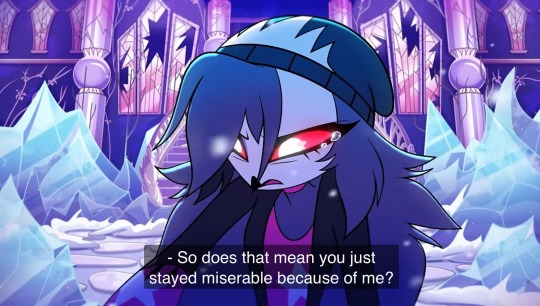
Of course, Octavia doesn’t know the full story, but she knows enough to be upset. She knows that Stolas was unhappy enough to need the pills, and he stayed in that environment for her. Thats a lot to process at 17. It’s not a nice feeling to realize your childhood was an extension of your parent’s trauma. It’s also not fun to realize your parent chose to harm themself for you, even if they did it to protect you. It makes you feel used, like you’ve been made into an accessory to hurting someone you love. In my mind, Octavia is processing all of this, AND that her dad ran off with a random man.
All this is to say, by my wildly non-canonical interpretation, I really feel for both Stolas and Octavia in this situation. For Stolas, making his own choices and following his instincts for once was important for him to do. For Octavia, it’s reasonable for her to feel upset at her dad, perhaps for more reasons than she realizes. She’s looking back on her relationship with Stolas, and how he raised her, and reevaluating everything. Their relationship is changing, and I hope we get to see a bit of that reflected in season 3.
#my little rant#I love them both#speaking of projecting#can you tell I’m projecting#helluva boss#stolitz#blitzø#stolas#hellaverse#blitzo#Octavia#helluva boss octavia#stolas helluva boss#Sinsmas#Sinsmas spoilers#media analysis#media rants#my stuff
256 notes
·
View notes
Text
dr ratio vs. the genius society | an analysis
this'll also be a comparison between ruan mei and dr. ratio so warning for that one too, just in case.
i saw this post by @chronical-lover
and firstly, i just want to say thank you, especially about mentioning how aeons don't care about humans because youre so right. i wanna expand a little bit on the comparison between his character and the genius' that we've met this far.
ratio ultimately failed to be recognized not because he wasn't smart enough, but because he was too human. he's human first, scientist second. he'll always be human first, he doesn't have it in him to act without emotions no matter how much he wants logic to dictate his every move. his entire character is that he believes every one has a human right to be alive, to learn and to grow. he's there to guide them, not necessarily in the nicest way, but still.
i think contrasting him with ruan mei in the story quest was a perfect idea. when you meet ruan mei, she's kind. she makes the trailblazer feel comfortable, even for just a little bit. she offers companionship, tea, and a conversation. but she does not care about the trailblazer or her creations, something painfully obvious in her actions. when the trailblazer was facing up against ruan mei's failed attempt to make a replica of the emanator of propagation, ruan mei was no where to be found. but you know who was, just in case he had to step in ? veritas ratio. even though both knew that the replica wasn't likely to hurt the trailblazer, ratio was there.
" since you're here, i won't intercede. but should you fail, i will be forced to prevent some avoidable misfortunes "
( i hate this man so much )
but he was there. he witnessed the fight, and once the threat was over, it was time to get going ( his words, not mine ). he was there to witness you fight, and should he had needed to, he would've stepped in to prevent us from any actual danger. however, when we approach ruan mei after the fight, and we look reasonably upset from her, we don't get an actual apology. she says she regrets her actions, but her words aren't actually about putting us in danger. she was upset that her experiment fell short, that she had made another predictable outcome.
" you look.. upset, correct ? i regret my actions. there's no defending what i've done. time and again, my experiments have fallen short, and they've always yielded predictable results. i made a clone but it.. doesn't hold a candle to the emanator. "
she did say that she would be there if the danger proved to be too great, but she was not. veritas, however, was. both of them said that they would step in if needed, but only one of them was actually in a position to do so. only one of them took preventative measures to make sure that you were safe from harm. and that is not the genius ruan mei, no matter what her words say.
ruan mei has a flowery way of speaking. not to say that she necessarily minces her words, she's upfront about a lot of things. but she lures the trailblazer into a false sense of security. she's introspective, and questions her own actions a lot. but she's never apologetic about the way that her actions put other people in danger, just that they don't yield the results she wants.
ratio, however, is curt. we meet him originally as a brooding, mysterious figure. he's mean, he doesn't use a lot of words to get his point across. he says what he means, and he's a fan of effective communication. he doesn't have to worry about himself, he knows who he is and how is actions affect himself and the people around him, and that leads to people assuming that he's egotistical ( which he might be , a little bit. as a treat ) but the reality is that ratio cares more about the people around him that he'll ever let on.
and that's where he fails. that's the fundamental difference between him and those within the genius society. ruan mei, herta, screwllum, and the other geniuses do not care about anything other than results. and yet ratio is kind. he's inherently kind, his actions are all for other people. he's saved a dozen worlds with his inventions. he's a scholar within the intelligentsia guild, and a doctor saving his patient's lives every single day. he wants to guide people from the shadows towards the right answer, he wants to make them use their brains and think.
he does not act without considering other people. he can't be a genius first, and a human second. and that's where he fails to gain nous' recognition. it's not that he's not not intelligent enough to be a genius, it's that even in his pursuit of knowledge, he has not forgone his humanity.
and perhaps, in nous' eyes, that's the difference between the mediocre and the genius. to erase every part of you, your emotions, your empathy, your humanity, in the pursuit of knowledge is what separates a genius from the masses. not having those barriers allows you to really dig deep into subjects that would otherwise be considered taboo or dangerous, because you don't care about how the outcome affects people as long as you can study it. as long as you can get answers out of what you're studying, it doesn't really matter what the test subjects are feeling.
ratio is too human, too caring, to ever be considered a genius in nous' eyes.
#dr ratio#honkai star rail#honkai sr#star rail#dr ratio hsr#veritas ratio#genius society#ruan mei#herta#hsr#screwllum#analysis post#character analysis#media analysis#discussion#i think he's too kind#kind in the sense that he will care about your wellbeing in a very#ratio way#i love him#and it makes me irrationally angry when people write his character off as a narcissistic asshole#because hes far from it#sorry you cant take a character who doesnt dance around the subject
757 notes
·
View notes
Text
DR RATIO ANALYSIS
SPOILERS FOR 2.1 CONTENT!
Now, you might be saying - "Aurae, Oh No! and Are You Satisfied? are much too basic songs to analyze Dr. Ratio to! Just because he's a scholar doesn't mean that he has academic trauma!" WRONG! Before we start, I have been researching psychology for approximately six years and I plan to go into it professionally. HOWEVER, that said, I am NOT a professional (YET. One day I will be. Yay for Aurae!) so understand that everything I come to conclusions about has been analyzed with some personal judgement, personal interpretations, and this is just what I have concluded with the info that I have deconstructed from his brain. If you disagree, that's fine!
I will be pulling from my own experiences with being a "golden" and "gifted" child, as well as the experiences I've had speaking to other people who were those. I will also be pulling from my experiences of researching and seeing how people with superiority complexes work, as well as diving into how those work (from what I've seen, as well as how they conceal a lack of self-esteem).
OKAY, NOW THAT THAT LONG AHH DISCLAIMER IS OVER, ALLOW ME TO WORK MY PSYCH ENJOYER MAGIC! Let's deconstruct Dr. Ratio like a lego toy.
Let's start off with how Dr. Ratio presents himself. When you first meet him, he seems like a haughty, arrogant asshole. He likes to PRESENT himself as a stoic, superior scholar who is purely in it to win it, and I got total "*stares down at your tiny body and laughs at how you lack knowledge*" vibes at the very start, due to how he goes around calling people idiots all the time. However, he DOES lose the idgaf war, and we can very quickly see that he does care for other people, even if in his own, strange way. Dr Ratio presentation: An asshole. The reality?
His entire character is based around the idea of helping the masses. He wishes to spread knowledge through the cosmos and give people who didn't have access to it, access. He's a harsh teacher, and calling people 'idiots' is NOT the way to motivate them, but he's doing his best™.
Actually, no, I'm going to go full psych into this. Okay, so here starts the Dr. Ratio and my FATHER COMPARISONS. My father is a professor and he is often called a harsh grader by his students. However, I've spoken to him multiple times because I was curious - why is he so harsh and diligent with his grading system? The answer is - he wants them to actually learn. When he's grading, he gives them harsh marks because he wants them to know exactly where they messed up, and he's always willing to stay after hours to help students understand where they can't. My father also is an enjoyer of knowledge, and for as long as I've remembered, he has prioritized teaching me how to think critically. He wants me to be able to think for myself - and I think that's what Dr. Ratio wants, too. He wants for his students to be able to fully comprehend and absorb the information that he teaches, and although his methods are harsh, he genuinely wants to help. My father's like this too - he hates students that waste his time or aren't here because their hearts are in it. Dr. Ratio hates people who aren't taking their education seriously because knowledge is important. Knowledge is a tool, and to disregard it completely is lowkey kind of insulting - especially when there are people who weren't privileged enough to actually get it, so this isn't something that you should take for granted. Dr. Ratio despises people who take knowledge for granted.
Also, I disagree with the claims that say that Dr. Ratio hates the genius society. He shows open respect for them in his voice lines. Just check them if you need proof. Also, I'll delve into the idea of Aeons and recognition later.
Now that we’ve established that Dr. Ratio kins my dad, let’s let's tackle the 'stoic' allegations. He is LOSING the idgaf war. Like, really badly. He has a temper of a thousand suns and snaps at people frequently, despite his 'impassive' face, his tone holds a LOT of emotion. He seems to feel very deeply and has a shit ton of empathy for others - why else would he be dedicating his entire career to helping others? Of course, he doesn't express this in 'typical' ways of being openly kind - but it doesn't mean that he doesn't care for other people. In fact, he seems to be pretty good at putting himself in the shoes of others and understanding them - expressed in the 2.1 quest where he tells Aventurine to tell him if he can't hold on any longer. Also, he loses the IDGAF war because he is actively trying to help people who want to learn and trying to spread logic and knowledge across the cosmos to those who didn't have it before. Would a man who didn't GAF do that? No!
Now that we've covered his view on knowledge and the way that he presents himself, let's turn to the way that he SEES himself. Now, this is where we get into the nitty gritty of gifted child trauma & academic trauma as well as crippling expectations. It's literally explicitly said in his character stories that he sees himself as mediocre, and it's canon that he doesn't have a good view of himself. His self-esteem is down in the fucking trenches along with my sanity as I write this analysis. The reality is - being called a genius your whole life doesn't really make you feel better about yourself. I'd know. I was. In fact, it makes you feel fucking worse when you can't live up to an expectation. We all fail in life. It's part of being human. But when you're held to such high standards - idolized for your knowledge and the way that you're 'gifted' - the crash comes really fucking hard. Failure is inevitable, and when people who are held on that pedestal experience it, they take it really bad.
The reality is that nobody - not even geniuses - are perfect, but you grow up believing that you are. Then, when you fail for the first time, it all comes tumbling down. The first time I came home with a bad grade was one of the most humiliating moments of my life. I hadn't studied because I was arrogant and I thought that I was smart enough to pass without putting any extra effort into it - because I was a 'gifted' child, right? I should've been able to do it without studying like the other kids. And that's the thing with gifted children – you grow reliant on that title. You cling onto it for dear life for motivation, as well as self-perception. Little by little, the person you are falls apart as you slave away to the perception other people have of you. I think basically every gifted child that I've ever spoken to is a victim of this – and of course, you can heal from this mindset - but it's a hard one to shake.
Ratio's way of presenting himself as being a 'genius' and 'arrogant' also seems to contradict the way that he calls himself 'mundane' at the same time. However, these are two mindsets that can coexist. One part of you believes that you are a genius and that you are perfect, while the other part is crumbling and calling yourself good-for-nothing every time you make a mistake. It's a tiring cycle to live in. This usually leads to people shutting themselves out and closing themselves off after living like that, pushing back your own feelings in favour of being the perfect child. However, we don't know the exact details of Dr. Ratio's childhood, but we can infer that he was held to a pedestal, and this is a very harmful mindset for a child to have.
His superiority complex comes both from how other people view him, but it's a way to cope with his crippling lack of self-esteem. I'm sorry my guy. Also helping others probably helps him feel like he's worth something and makes him feel better because he bases his entire worth off of what he can do and how he can help others. However, this is just my personal interpretation backed by what I have already deconstructed.
In general, this is an easy way to crush self-esteem. You spend your whole life working to meet the image of what other people think you are. In fact, another reason why Dr. Ratio might be so harsh is because that’s the kind of attitude he holds towards himself when conducting research – he’s as hard on himself as he is to others. You end up hating the idea of failure, instead of seeing it as it should be - a way to improve and grow. Actually, I think this could be a reason that he went out of his way to break that illusion of 'worshipping geniuses' in the Space Station. Maybe some sort of childhood connection? Personal connection? In his endeavour to spread more knowledge and make people think for themselves and not blindly follow geniuses, to wake them up and let them think for themselves - maybe, somewhere, in there, he's helping that little child that was almost dehumanized for his intelligence. TLDR: Conflicting mindsets due to trauma, brain vs heart almost - his knowledge that he is a genius vs the crippling lack of his self worth.
Now that we've established Dr. Ratio's self worth, let's take a look at the impact Aeons had on him. Nous, the Aeon of Knowledge itself. I think in a world where the Gods are real, tangible beings that you can reach out and talk to - it makes sense that someone with high ambition and someone who's been called a genius his whole life would seek the confirmation of Nous. When you're a man of knowledge, and you've spent your whole life working with it, being praised for it – it feels natural to look for a god to look down upon you and bless you, right? The Genius Society – it should house him, because he is a genius as well, right? Imagine this – you have been called a genius your whole life, held to that kind of pedestal for so long, and now you wait for the recognition of the Gods. Because if you truly are a genius – then surely, a higher being will recognize your intelligence, right?
The invitation never comes.
And then, comes the doubt.
What if I'm really not a genius? What if everything I've worked for is a lie? Aeons are beings that are 'absolute'. If the god of Knowledge won't accept you or even cast a glance upon you, does that mean that everything was wrong. Gods see more than humans, after all. Gods know more than humans - and that spiral... I think you can see if. (If you don't let me know. I will ramble about how a failure like that can make you spiral down into a worse mindset).
However, the reason why Ratio was never invited to the Genius Society is simple. It’s because he LOSES THE IDGAF WAR. Now, if we look at all the people we know who are in the Genius Society - we find one thing in common. They’re in it to win it for themselves. They don’t help others using the knowledge that they’ve gotten - they use it to pursue shit for themselves. The people of the Genius Society are inherently self-serving. They WIN the idgaf war. Ratio LOSES. Do we see now?
Ratio’s empathy is the reason why he wasn’t let in. He is too human. Nous is a computer. Herta is detached from people. Ruan Mei is literally looking at life as test subjects. Screwllum is a robot.
OUR DOCTOR MAN LOST THE IDGAF WAR, BECAUSE HE IS HUMAN AND FEELS FOR OTHERS!!!
Also, it’s a plausible theory that Nous’s definition of ‘genius’ is different from the human definition of ‘genius’ – it’s a computer, after all. Who knows what’s going on in that code head of its.
However, we still love you Ratio. Never stop losing the IDGAF war.
TLDR: Nous is a computer. It is also in it to win it. It is also self serving. It gazes upon the hoes who are here to win it for themselves. Ratio is busy serving the masses and cooking knowledge in his frying pan. To it, there is no logical reason to be doing this. Therefore, no reason to invite this guy to the Genius Society.
Ratio’s gifted child trauma says otherwise. He wants in. Why wouldn’t he? He’s been working his whole life as a genius.
Nous is like… nah bro, you care too much. Ratio is like, ‘what the fuck?’ And then the AEON OF KNOWLEDGE GOES FOR THE MILK.
Okay, now, quick shoutout to Ratio wanting to help others. He is just like me fr. SO BASICALLY, RECAP OF EVERYTHING I JUST SAID:
Ratio LOSES the idgaf war because he cares about other people. Spent his whole life as the golden egg, and then turns to the gods for recognition because of the inherent trauma of being a child genius. He goes, "hey bro, can you confirm that I am in fact a genius?" and Nous goes, "no, you are too busy cheffing for the masses." Ratio goes, "what the fuck?" and then we collectively realize his attitude comes from blocking off his feelings (while failing miserably), being salty about not being recognized, being put on a pedestal for his whole life, and his crippling depression *cough* lack of self worth *cough*.
Oh, and the "I will never be enough" thought train probably hits him every single day. He is not enough to be recognized by a God. Gods are superior to humans. Maybe nothing has worth after all. Hey, that's Nihility! Hi IX, let's hear what you have to say.
*muffled ix noises*
I see, I see.
The consensus is: HE'S TRAUMATIZED BY EXPECTATIONS! HE WILL PROBABLY SUFFER FROM BURNT OUT GIFTED CHILD IF HE HAS NOT ALREADY!
Okay, now, before I delve into song lyrics (and I KNOW this has been long, just bear with me) I want to talk a little bit (read: a lot) about his relationship with Aventurine. We all know that he cares about Aventurine in his own way. But I want to pull in another idea that I didn’t cover before:
Ratio’s fucking emotional constipation.
Basically, the reason why he has trouble connecting with others is because he was most likely alienated by others as a symptom of being called a genius and being put on a pedestal. This makes him seem unapproachable to his peers, most likely, and therefore, as a result, doesn’t know how to properly connect with others. This just makes his way of presenting affection and care to others even more challenging – because he just doesn’t know how to do it in a healthy and clear way. Academic trauma causing emotional problems, because he’s probably a little bit out of touch with his own. Processing? No! Research. Also, this is very important for understanding Ratio’s character in my opinion, because he’s just a little guy who doesn’t know how to articulate. Maybe he’s got a touch of the ‘tism. Tism mutuals, do we agree or disagree?
However, in comes Aventurine. Love Aventurine, but they are both emotionally constipated. Aventurine displays his affection in ways that Ratio probably only catches after re-analyzing their time together about five times. He’s also a very closed off individual – but Ratio knows this. A cute thing is that Ratio is patient where he needs to be, even if he’s generally a pretty hot-headed guy, and I’m like… bro… that letter… “I wish you the best of luck”... I will wait for you…. GAY ASS MAN…
Sorry the Aventio demons took over. Anyway, what I’m trying to say here is that they both have nonverbal communication with one another that they clearly decipher and Ratio obviously cares for him (he came back and almost jeopardized the plan just for the sake of his ‘coworker’... okay gayboy…) and they just have such a neat little dynamic… Aventurine lets Dr. Ratio do his thing… understands his emotional alienation to a degree…. they’re so neat….
Okay, Aventurine segment over. NOW, FINALLY, WE CAN GET TO THE SONG LYRICS!!! YAY!!!! We all cheered!!!
We are going to be here for two more amber eras, because I realized I actually want to analyze every single lyric from both of these songs. Brace yourself for like, 2k more words. Help.
I think it’s only proper that we start off with ‘Oh No!’ the song that has haunted me since my childhood.
“Don’t do love, don’t do friends
I’m only after success
Don’t need a relationship
I’ll never soften my grip”
Remember when I mentioned that alienation was a big part of Ratio lore? Yeah, that manifests itself in this. When you spend your entire life chasing after knowledge and being held to that standard of untouchable genius, it makes sense that you couldn’t connect with others and that you turn your gaze only to success. Therefore, relationships that are interpersonal lose meaning for a bit – you’re just looking for answers and ways to help them, not connect with them. Also, this is what he wants to do – so he’s never going to pass down an opportunity to better himself or to help someone else.
“Don’t want cash, don’t want card
Want it fast, want it hard
Don’t need money, don’t need fame
I just want to make a change
I just wanna change, I just wanna change”
This is directly alluding to his reasonings for distributing knowledge across the cosmos. Was he based on this song? Maybe he was. He’s not looking for money or fame, his ultimate goal is actually pretty selfless – to bring knowledge and give people the tools they need to think for themselves. He just wants to make a change – he just wants people to be able to have access to knowledge and help cure ‘stupidity’. He wants to do it as quickly as possible, always reaching for lofty goals that might seem impossible, but he will make them possible.
“I know exactly what I want and who I want to be
I know exactly why I walk and talk like a machine
I’m now becoming my own self-fulfilled prophecy
Oh! Oh no! Oh no! Oh no, oh!”
Ratio knows his goal. He knows what he’s working towards. I do believe that he understands why he is the way that he is – he has a degree in Psychology, after all. He knows how he’s been hurt but at the same time, the trauma brain probably doesn’t want to recognize it and he hasn’t stepped into healing yet. He knows what he went through impacted him, but he’s too busy helping others to help himself. He’s becoming what he wants to be, and yet he’s not, all at the same time – which causes the idea of “oh no!” as a kind of cry for help, almost. He’s too proud to ask for it himself, of course, so he’ll fall alone until someone manages to catch him and give him the strength to continue holding on. Aventurine is that.
“One track mind, one track heart
If I fail, I’ll fall apart
Maybe it is all a test
‘Cause I feel like I’m the worst
So I always act like I’m the best”
Now, these are the exact lyrics that made me associate this song with Ratio in the first place. He’s got a singular goal that he will do nothing to stop at getting, that he goes so far to get to. However, as I mentioned earlier, failure is not an option for those who were deemed gifted or genius. You are perfect, so therefore you must live up to everyone’s every expectation and surpass them, too, in order to keep your perception of yourself intact. Ratio does not hold himself in high regard, but acts arrogant in order to hold himself together and not fall to the self-deprecating thoughts, even if they fall through the cracks. It gets tiring to hold yourself together like that for a long time, you know?
“I’m gonna live, I’m gonna fly
I’m gonna fail, I’m gonna die
I’m gonna live, I’m gonna fly
I’m gonna fail, I’m gonna die”
Remember how I was talking about contradictory mindsets and how they can coexist. This is them. The feeling of crippling self-hatred and lack of self esteem versus the idea that you can do it, you can make a difference – you were born a genius, this is what you’re going to do. This is the knowledge that you are a genius vs the lack of self-esteem that Ratio has. “Mediocre” vs “genius” mindset, eh?
All the other lyrics in this song are repetitions of what I’ve analyzed before, so let’s move onto “Are you Satisfied?”
To be honest, there are only a few lines in this song that allow me to connect it to Ratio, so therefore, I will only be analyzing them. However, if you think that other lyrics can connect to him, I’d be interested in knowing how.
“What you’re gonna be
It’s not my problem if you don’t see what I see
And I do not give a damn if you don’t believe
My problem, it’s my problem that I never am happy
It’s my problem, it’s my problem on how fast I will succeed”
Pretending to not care about how the world sees you is so fucking real. Sometimes, you really don’t give a shit, and sometimes it’s all you can think about. Ratio… doesn’t seem like he’s the happiest person. He works himself hard and he’s always chasing after a goal that must be exhausting. He’s always doing his best, and I think even with his empathy, it’s easy to start not giving a shit after trying for so long and so hard. Accepting help is one of the hardest things that anybody can do, especially with how much pride he has. His personal problems are his personal problems and he can deal with them on his own.
“High achiever, don’t you see?
Baby, nothing comes for free
They say I’m a control freak
Driven by a greed to succeed
Nobody can stop me”
Nothing comes for free. A lot of the things Ratio has achieved is due to his own intelligence, yes, but also because of a shit ton of hard work. His goal is literally to cure the universe of ‘stupidity’ – and that’s a pretty large fucking goal. He is a high achiever who likes to know the details of every situation when he can in order to try and make things better, and he is driven by a greed to succeed. Why wouldn’t he be? Success is important, and success means helping more people. He isn’t going to allow himself to be stopped by anybody – not even anybody from the Genius society.
Okay, and we have finally reached the end of my analysis! This caps at around 4k words, so if you stuck around for this long, thank you so much. I would love to hear any of your comments, and I hope you laughed a little bit. Thank you again! This means so much to me that you read. <3
#dr ratio#drratio#honkai star rail#hsr#hsr dr ratio#hsr ratio#veritas ratio#character analysis#song lyrics#song analysis#attempt at humour#so that you don't get bored#long ahh analysis#analysis#media analysis#aventio#ratiorine#managed to sneak them in#i love homos#help#god help me#aurae analyzes
565 notes
·
View notes